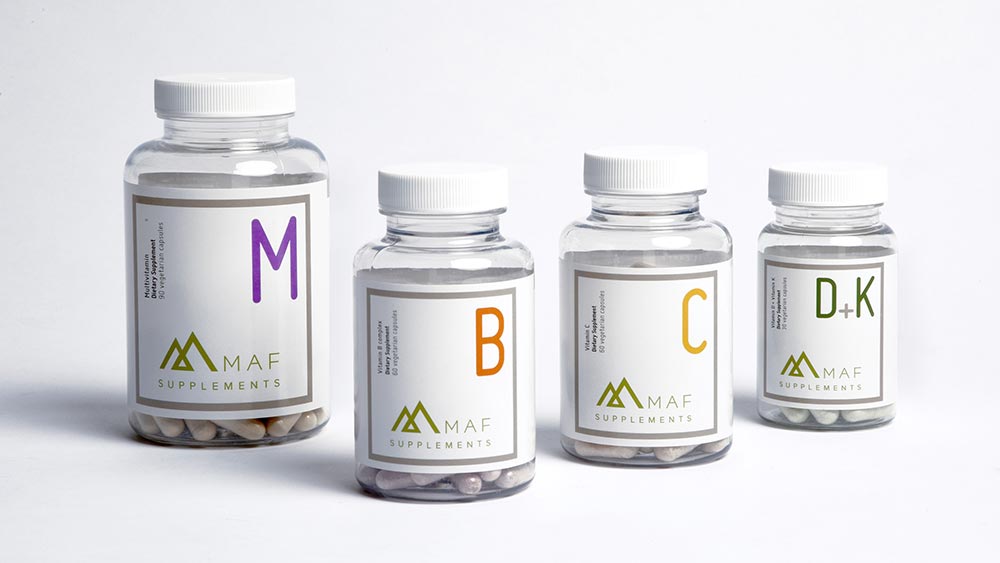
Now available on the MAF shop
The new MAF Supplements contain high-quality freeze-dried, organic foods such as blueberries, spinach, kale, beets, broccoli sprouts and other fruits and vegetables rich in vitamins, minerals and phytonutrients as nature intended.
Many people know my career includes formulating unique natural products, including dietary supplements. After years of research and development, I produced my first line of real food-based, certified-organic dietary supplements more than 17 years ago.
Today, I am again asked this question as our new line of dietary supplements made with organic food is released. The answers are simple. Read on to get the full picture, or click on the button below if you’re eager to check out the supplements.
New scientific and clinical discoveries about food and nutrition lead to improved dietary supplement formulations. Unfortunately, almost all the products in the marketplace have used the same basic ingredients for decades, just different versions. (Most hyped-up “new” products are no different, and disappear as fast as they arrive.)
Vitamin D is a good example of new discoveries put to better use. We now know that natural food sources of D3 plus sunshine provide uniquely complementary benefits for immune function and positive gene stimulation. This is why MAF supplement formulations account for this by including vitamin D3 — the most active form of the vitamin — as well as corresponding nutrients needed to make D work well, including vitamins K1 and K2.
An important component of the new MAF supplement line is nutrient-dense freeze-dried foods. Most other food-based products, including green powders and supplements, incorporate juice and other plant materials cooked at high temperatures, not to mention sugar and difficult-to-pronounce additives in the ingredients list.
Instead, my products contain high-quality freeze-dried, organic foods such as blueberries, spinach, kale, beets, broccoli sprouts and other fruits and vegetables rich in thousands of phytonutrients. Scientists have yet to fully discover the nutritional value of most of these compounds.
In developing these supplements it was especially critical to fill the void for a healthy B vitamin supplement. The foods we eat contain active vitamins — the form best used by the body. For years I’ve searched for a complete naturally active B vitamin complex, but to no avail: Almost all B vitamins in the marketplace are in their inactive, unnatural forms, which the body must transform into the active versions before they are usable. We formulated our B-complex formula to contain all these hard-to-find active vitamins — including the active form of folate, the healthy cousin of inactive, synthetic folic acid, which can have potentially dangerous effects.
The MAF Multi — a vitamin-mineral-phytonutrient complex—contains all eight components of the vitamin E “complex” — not just the alpha tocopherol common to most supplements, but all four tocopherols, as well as the four tocotrienols. These nutrients are difficult to obtain even in the best of diets, and are more important than just the alpha tocopherol (vitamin E) alone.
It’s important that a dietary supplement contain a natural dose of nutrients. When eating a meal of high-quality nutritious food, we consume nutrients in their natural doses. As you know, I’ve written at length about the dangers of high pharmaceutical doses. For example, unnatural doses of synthetic vitamin C, even 500 or 1,000 mg, are potentially harmful. Even the Linus Pauling Institute — once an enthusiastic proponent of high-dose vitamin C — now recommends lower doses.
So, if these products are so unique and highly nutritious, why don’t other companies make them? For years I’ve been told by industry insiders: as long as there are high profit margins and massive growth, why change the cheap product portfolios? After all, record numbers of people continue buying junk supplements regularly.
Many consumers are also misled by the sneaky tactics used to make so-called “real food” formulas. Some of these are produced by feeding synthetic vitamins to yeast. The yeast is then processed and put into pills, and these yeast products are touted as natural or “real food.” Some companies even feed synthetic vitamins to yeast and add organic plant materials in order to call the resulting products “organic.” I’m still not sure how the FDA and FTC allow this to continue.
Of course, it goes without saying that the best products don’t contain additives, fillers, binders, lubricating and manufacturing agents and other chemicals. Current regulations don’t even require some of these agents to be listed as ingredients. They are often used to reduce costs by helping speed up the manufacturing process, causing further harmful heating of the ingredients. Filling the capsule with real, freeze-dried foods is a much better strategy, providing real nutrition while eliminating the need for added chemicals.
Most importantly, I will still use my dietary supplements wisely, and hope others will as well — by supplementing the healthiest diet possible, not by replacing an unhealthy one. For example, I like adding these supplements, especially the high-quality multi-nutrient complex, to my smoothies.
Natural-oriented consumers avoid unnatural products.
We can’t make tomorrow’s products using yesterday’s ingredients or technologies. But just to be sure, open up one of my capsules to see, smell and taste the real foods inside!
To check out our new dietary supplement line-up, click the button below:








